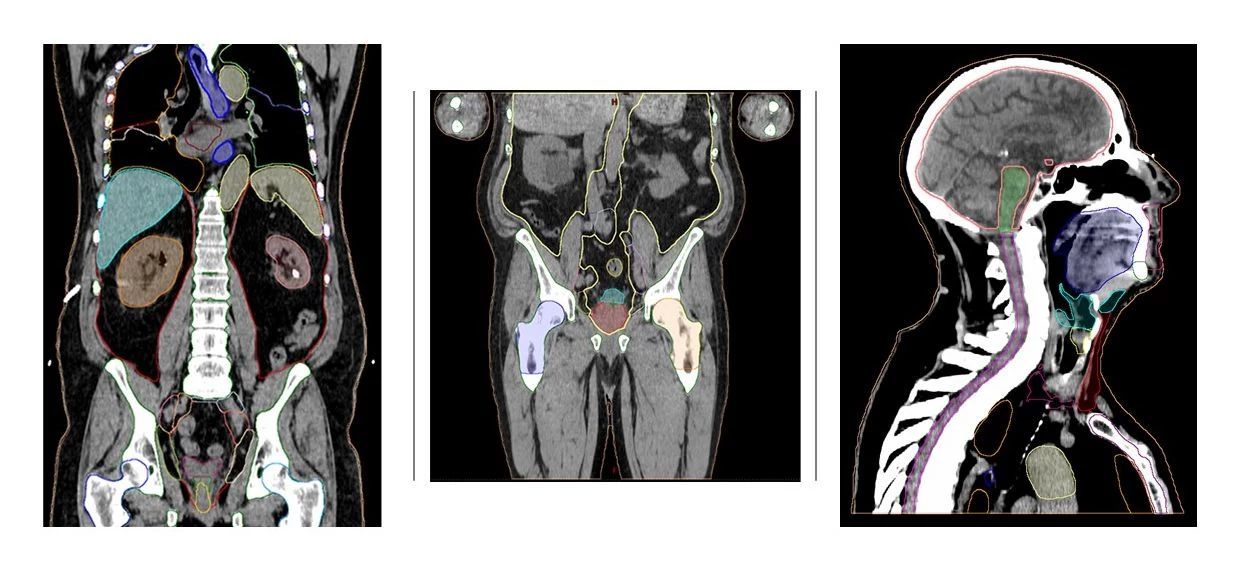Varian’s Advanced Oncology Solutions (AOS) can now offer the Siemens Healthineers AI-Rad Companion Organs RT1 solution as part of its treatment planning services, allowing Varian experts to provide client cancer centers with remote dosimetry and radiotherapy treatment planning.
“Varian’s combination with Siemens Healthineers continues to pay off, as we have successfully integrated the use of AI-Rad Companion Organs RT with Varian’s Eclipse™ treatment planning software, said Mika Miettinen, Vice President, Technology Enabled Solutions at Varian. “By incorporating this artificial intelligence tool into our treatment planning workflow, we are able to further enhance operational and clinical efficiency for our customers. It reduces the amount of time we need for organs-at-risk contouring, to produce complex, sophisticated treatment plans that narrowly focus the radiation dose on the targeted tumor and minimize the impact on surrounding healthy tissues.”
AI-Rad Companion Organs RT is an artificial intelligence (AI)-based solution from Siemens Healthineers that provides radiation oncology clinicians with automatic contouring of organs at risk, an otherwise extremely time-consuming process that also creates variability in radiation therapy treatment planning when done manually. By leveraging artificial intelligence, AI-Rad Companion Organs RT was designed to produce high-quality contours of organs at risk—the areas of anatomy that require protection during treatment—while reducing the amount of time needed to produce those organs-at-risk contours.²
Christus Health, a Texas-based health system, and American Oncology Institute™ (AOI), a leading cancer care provider operating a chain of cancer hospitals across India, are the first clinical networks to benefit from the integration of AI-Rad Companion Organs RT with Eclipse, which are hosted in the cloud so that clinicians at the client sites can easily share data and collaborate with Varian’s remote dosimetry service providers.
The Simulation/Planning Process
At Christus and AOI cancer centers, a patient’s CT simulation images are sent directly to the cloud-hosted Eclipse software. The Varian dosimetrist then transfers the images to the cloud-hosted AI-Rad Companion Organs RT, which automatically creates the needed organs-at-risk contours. When the contouring process is complete, the images are automatically transferred back to Eclipse. The Varian dosimetrist reviews and/or edits the contours and uses them to generate high-quality treatment plans that are transferred back to the client site for use during patient treatment.
According to Rajesh Gutti, Regional Director of Physics for AOS, the addition of the AI-Rad Companion Organs RT solution to the cloud-based dosimetry services from AOS is designed to allow Varian dosimetrists to save time on contouring with the goal of achieving consistent results when contouring organs at risk. “We are in the process of gathering data on the time savings and consistency in contouring results achieved with the implementation of AI-Rad Companion Organs RTsolution into the clinical workflow,” he said. “We look forward to sharing more about the efficiency gains when we have accumulated more data.”

“It is exciting for us to see how the Siemens Healthineers/Varian combination is starting to accelerate our strategy of offering digitally enabled services to help customers tackle the increasing cancer burden in both developed and developing countries,” said Miettinen. “Treatment planning is among the many technology-enabled services Varian provides through AOS, to support cancer centers as they deploy and utilize complex and evolving technologies. Cancer centers face tremendous challenges, from rising costs and technological complexity to shortages of skilled personnel. By contracting with AOS, a cancer center can fill gaps in its resources, standardize and optimize clinical processes, and realize operational and clinical efficiencies.”
AOI Pilot Project: AI-Rad Companion Organs RT Confers Quality and Productivity Gains in Organs-at-Risk Contouring
In Hyderabad, an AOI clinical team conducted a pilot program to evaluate the benefits of integrating AI-Rad Companion Organs RT, with its AI-powered algorithms, for high-quality contouring of organs at risk (OAR), with Eclipse-based TPaaS. According to Sushil Beriwal, MD, Vice President, Multi-Disciplinary Oncology, Medical Affairs, eleven radiation oncologists across seven AOI institutions evaluated 1,400 AI-Rad Companion Organs RT-generated contours encompassing 33 organs. The AI-Rad Companion Organs RT solution performed extremely well, with over 95% of the AI-generated contours being accepted by treating physicians with minor or no edits. The pilot project confirmed what others have reported3,4—that use of AI-Rad Companion saves time in the organs-at-risk contouring process while enabling standardization across their network.
The results by Siemens Healthineers’ customers described herein are based on results that were achieved in the customer's unique setting. Since there is no "typical" hospital and many variables exist (e.g. hospital size, case mix, level of IT adoption) there can be no guarantee that other customers will achieve the same results.
References
1AI-Rad Companion Organs RT is not commercially available in all countries, and its future availability cannot be ensured.
2Peng JL, McDonald DG et al. Clinical Feasibility of Commercial Artificial Intelligence-Based Auto Contouring of Target Volumes and Organs-at-Risk in Breast Cancer Patients. Int J Radiat Oncol Biol Phys. 2022 Nov 1;114(3S):e585.
3Ginn JS, Gay HA et al. A clinical and time savings evaluation of a deep learning automatic contouring algorithm. Med Dosim. 2023 March;48(1):56-60.
4Pera O, Martinez A, et al. Clinical Validation of Siemens’ Syngo.via Automatic Contouring System. Adv. Radiat. Oncol. 2023 Jan 15; 8(3);101177.